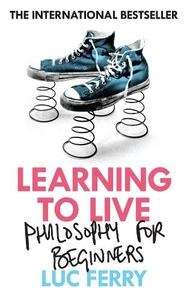Learning to Live
Philosophy for Beginners

Editorial Canongate
Fecha de edición julio 2010
Idioma inglés
EAN 9781847672865
Libro
encuadernado en tapa blanda
Resumen del libro
From the ordered universe of the ancient Greeks to the shadows of Nietzsche's nineteenth century, Learning to Live shakes the dust from the history of philosophy and takes us on a fascinating journey through more than two millennia of humanity's search for understanding - of the world around us and of each other. Both a sparkling and accessible history of Western thought, and a courageous dissection of how religion and philosophy have converged and clashed through the ages, Luc Ferry's blueprint for a new humanism challenges every one of us to learn to think for ourselves, and asks us the most important question of all: how can we live better?
Biografía del autor
Luc Ferry (Colombes, Francia, 1951) es un filósofo, ensayista y político francés. Doctor en Ciencias Políticas y profesor de Filosofía y Ciencias Políticas, ha sido investigador asociado en el Centro Nacional para la Investigación Científica de Francia. Desde 2002 hasta 2004, fue ministro de Juventud, Educación Nacional e Investigación antes de ser nombrado miembro del Comité Consultivo Nacional de Ética en 2009 por el presidente Nicolas Sarkozy. Considerado como uno de los filósofos más destacados de Francia, Luc Ferry, a partir de las críticas al movimiento de Mayo de 68, desarrolló una original filosofía política liberal, centrada en particular en la ecología, la tecnología, la familia y la ética y en contra de los movimientos radicales. Es autor de más de treinta libros, muchos de ellos traducidos a diversos idiomas, entre los cuales: El hombre-Dios o el sentido de la vida (Tusquets, 1997); Aprender a vivir: filosofía para mentes jóvenes (Taurus, 2007), La tentación del cristianismo: de secta a civilización (Paidós, 2010); La revolución transhumanista: cómo la tecnomedicina y la uberización del mundo van a transformar nuestras vidas (Alianza, 2017).








